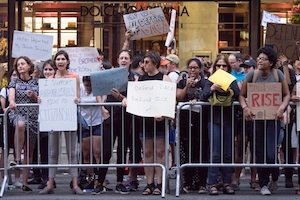Government & Politics
Ask the Expert: Professor Ernesto Castañeda Discusses the Latest on DACA

Ernesto Castañeda is an assistant professor of sociology at American University and the editor of Immigration and Categorical Inequality: Migration to the City and the Birth of Race and Ethnicity , a new book that gives insight into the rise of nativism in the United States and beyond.
We asked Professor Castañeda to weigh in on DACA: what does it mean, what might happen next, and what he wishes would happen in terms of immigration reform.
What does Trump's pledge to end DACA mean for the 800,000 people known as DREAMers?
For the people currently under DACA, the termination of this program means a return to an undocumented status and the daily fear of deportation and separation from family members, friends, coworkers, and the lives they have built living in America for most of their lives.
This fear is multiplied, given that they have given their addresses and personal information to the US government. DACA created avenues for thousands of people to come out of the shadows, speak publicly about their undocumented status, attend college, stay in the military, work in the mainstream economy and apply their skills, buy houses, etc. Like the termination of Temporary Protection Status for Haitians and Central Americans, the end of the DACA could mean a return to a country they no longer know, a return to a clandestine life, the informal economy, or a detention center.
Of course, nothing would change if the budget of the US Immigration and Customs Enforcement (ICE) was cut and people engaged in civil disobedience, or if the DREAM Act passed.
At this point, do you believe Congress will act to give the DREAMers legal status or a pathway to citizenship?
A majority of Americans are in favor of legalizing DREAMers and fixing America's immigration system. To the point that we want to live in a true representative democracy, we must put pressure on our representatives to pass legislation that gives DREAMers citizenship, and provide a path to citizenship for the rest of people living in the country in a an undocumented status. For the very small percentage of people with a criminal record, the legal system can deal with them the way it deals with US-born criminals.
While it is unfortunate that DACA may end soon, and many youth will be back in limbo and experiencing intense anxiety because of that decision, there is an opportunity to push for a bipartisan bill to address immigration reform and create a pathway for citizenship for both the dreamers, their parents, and other undocumented immigrants.
What would good immigration reform look like to you, for the DREAMers and other undocumented immigrants currently living in the United States?
I believe that America deserves comprehensive immigration reform, and a truly comprehensive immigration reform would:
- Give a blanket amnesty to everyone in the United States as of the day that the bill passes.
- Require applicants to keep paying taxes and pay back taxes in case they have not done so.
- Provide social security numbers and match new accounts with previous contributions made.
- Secure the border by increasing the checks of people leaving the country to reduce the numbers of guns being illegally smuggled into Mexico.
- Increase patrolling of unpopulated areas to secure that less people die of dehydration while walking through the desert for days.
- Keep the family reunification provision currently in law, while providing more resources for paperwork processing to decrease waiting times.
- Adjust current immigration quotas to allow more highly qualified workers, as well as agricultural workers, to come to the US with work visas.
- Adjust the current country-specific immigration visa quotas to reflect communities already in the United States and the populations of those countries.
- Have no racial, religious, or economic preferences in the immigrant VISA process.
- Increase or remove the refugee ceiling.
Only by taking on these number of issues simultaneously will we fix the problem of having undocumented people in the United States now and avoid a future population in such status in the future.
This wish list may same unrealistic to some. But the only thing needed is political will to overcome the opposition from a loud but small anti-immigrant minority. Only comprehensive immigration reform would provide a long-lasting solution to the broken immigration system by creating a path for future workers to come with working visas and thus eliminate the need to be undocumented.
